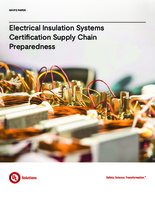
Electrical Insulation Systems Certification Supply Chain Preparedness
When an electrotechnical device manufacturer experiences a materials shortage for the electrical insulation system (EIS) used in the device, it is necessary to find an alternate source.

Safety and performance reliability are essential attributes for an electrotechnical device such as a motor, transformer, generator, solenoid, etc., and the electrical insulation system (EIS) used in the device is a critical link. An EIS is a unique combination of electrical insulating materials (EIM) used in electrical equipment, closely packed together, operating at or below the maximum operating temperature of the device. An example is the combination of magnet wire, slot liner insulation, end cap insulation and impregnating resin in a motor.
The main function of EIM is to provide a dielectric barrier between one voltage potential and another, and between grounded or dead metal. All other materials used for mechanical support or construction purposes and not relied upon to provide electrical protection are considered nonelectrical insulating materials (NIM).
Since the EIM used to build an EIS are plastics, the production of a device requiring a certified EIS may be severely disrupted whenever there is an event, foreseen or unforeseen, that impacts the availability of plastics. This was recently demonstrated when polymer producers declared a force majeure to their customers because of a shortage of raw materials.
This UL Solutions white paper will describe how to retain EIS certification when disruption occurs, as well as ways to plan for any future disruptions.

Electrical Insulation Systems Certification Supply Chain Preparedness